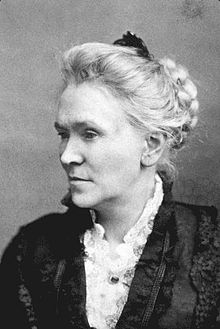Matilda Joslyn Gage
| Matilda Joslyn Gage | |
|---|---|
 |
|
| Born | Matilda Electa Joslyn March 24, 1826 Cicero, New York, U.S. |
| Died | March 18, 1898 (aged 71) Chicago, Illinois, U.S. |
| Occupation | abolitionist, freethinker, author |
| Notable works | Author, with Anthony and Stanton, of first three volumes of History of Woman Suffrage |
| Children | Maud Gage Baum, Charles Henry Gage, Helen Leslie Gage, Julia Louise Gage, Thomas Clarkson Gaga father of Dorothy Louise Gage |
| Relatives | Hezekiah Joslyn, father |
Matilda Electa Gage (née Joslyn; March 24, 1826 – March 18, 1898) was a suffragist, a Native American rights activist, an abolitionist, a freethinker, and a prolific author, who was "born with a hatred of oppression".
Matilda Gage spent her childhood in a house which was used as a station of the Underground Railroad. She faced prison for her actions under the Fugitive Slave Law of 1850 which criminalized assistance to escaped slaves. Even though she was beset by both financial and physical (cardiac) problems throughout her life, her work for women's rights was extensive, practical, and often brilliantly executed.
Gage became involved in the women's rights movement in 1852 when she decided to speak at the National Women's Rights Convention in Syracuse, New York. She served as president of the National Woman Suffrage Association from 1875 to 1876, and served as either Chair of the Executive Committee or Vice President for over twenty years. During the 1876 convention, she successfully argued against a group of police who claimed the association was holding an illegal assembly. They left without pressing charges.
Gage was considered to be more radical than either Susan B. Anthony or Elizabeth Cady Stanton (with whom she wrote History of Woman Suffrage and Declaration of the Rights of Women). Along with Stanton, she was a vocal critic of the Christian Church, which put her at odds with conservative suffragists such as Frances Willard and the Woman's Christian Temperance Union. Rather than arguing that women deserved the vote because their feminine morality would then properly influence legislation (as the WCTU did), she argued that they deserved suffrage as a 'natural right'. Despite her opposition to the Church, Gage was in her own way deeply religious, and she joined Stanton's Revising Committee to write The Woman's Bible. She became a Theosophist and encouraged her children and their spouses to do so, some of whom did.
...
Wikipedia
